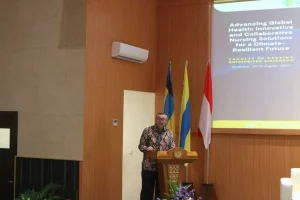UNAIR NEWS – For the first time in over two decades, Indonesia has experienced an annual deflation rate of 0.09 percent. According to the Central Bureau of Statistics (BPS), this phenomenon has been driven by multiple factors, including electricity tariff reductions and falling prices of key food commodities such as rice, tomatoes, and red chilies.
Deflation data
An economic expert from the Faculty of Economics and Business Universitas Airlangga (UNAIR), Prof. Dr. Sri Herianingrum, SE, MSi, stated that this deflationary trend signals a potential economic slowdown. Based on BPS data, monthly deflation reached 0.76 percent in January 2025 and 0.48 percent in February 2025.
“The data for March is pending release in April, particularly given the impact of Ramadan, which typically drives inflation. For comparison, inflation during Ramadan was recorded at 0.16 percent in 2023, increasing to 0.52 percent in 2024,” she explained.
Market oversupply
According to Prof. Herianingrum, the current market conditions indicate an oversupply of several primary commodities, including cooking oil and eggs. This surplus has resulted in significant price drops as demand fails to keep pace with supply.
“For instance, the price of eggs, which peaked at IDR 29,000 per kilogram in December 2024, plummeted by approximately 30 percent after the New Year. The decline in consumer purchasing power is particularly evident in traditional markets, which are typically bustling ahead of iftar but are now noticeably quieter compared to previous years,” she noted.

Economic risks
Prolonged deflation reflects a sharp decline in demand, potentially stalling economic growth. As purchasing power weakens, economic transactions decline, making it more challenging for producers to sell goods. This could ultimately lead to reduced production and even workforce reductions. If this trend persists, deflation may serve as a critical warning for the government to implement immediate strategic interventions.
Government policies
From a policy standpoint, Prof. Herianingrum emphasized the need for well-calibrated monetary and fiscal strategies. Monetary policies could focus on expanding the money supply, such as through interest rate reductions to stimulate activity in the real sector.
“Meanwhile, fiscal policies should aim to strengthen consumer purchasing power and support micro, small and medium enterprises (MSMEs). The government must also ensure that investments directly contribute to economic recovery rather than placing additional strain on the national budget,” she stated.
Prof. Herianingrum also noted that post-election uncertainty has influenced consumer spending behavior, with many individuals choosing to delay expenditures due to financial constraints or concerns about future economic conditions. As a result, more aggressive stimulus policies are necessary to reinvigorate economic activity and restore public confidence in the market.
Author: Rosali Elvira Nurdiansyarani
Editor: Khefti Al Mawalia









